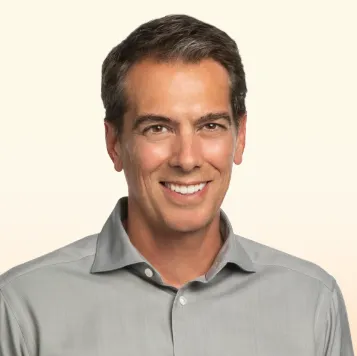As CFO of global enterprise software company Workday, Zane Rowe is no stranger to the evolving demands placed on finance chiefs.
With nearly two decades of leadership across industries, he brings a broad perspective on what aspects of the CFO role have shifted in the 21st century — and what has remained constant.
From his experience guiding the merger of Continental Airlines and United Airlines in his early days, to a sales executive stint at Apple and multiple CFO roles at groundbreaking technology companies throughout his career, Rowe’s insights on the evolving CFO narrative, successfully leveraging data, driving change in legacy organizations and the role of personal health and well-being in effective leadership are valuable for finance leaders at any stage of their career.
Zane Rowe

CFO, Workday
First CFO Position: 2008
Noteable previous employers:
- VMWare
- EMC
- Apple
- Continental Airlines (merged with United Airlines under Rowe in 2010)
This interview has been edited for brevity and clarity.
ADAM ZAKI: There is so much talk about the “evolving role of the CFO.” In your nearly two decades working as a finance chief, what has stayed the same?
ZANE ROWE: Looking back, the parts of the CFO role that haven’t changed are the simultaneous focus on value preservation and creation, close connection to stakeholders, commitment to integrity and sound decision making based on quality data.
In my experience, CFOs have consistently been key players in fostering collaboration, working across different parts of the company and engaging with the board and fellow executives. While the emphasis might shift and the tools we use are always evolving, the core elements of the role hold true.
So what has changed?
The evolution of the CFO’s toolkit and the impact it has on the way business is done. Even before my time at Workday, when I was in the airline industry, we were heavy technology users. But what we’re able to do with technology today has significantly expanded because of data, which in turn, has impacted the nature of business and reshaped our interactions with stakeholders and customers.
Today, we can use tools to better handle larger data sets and utilize those data sets strategically to make more informed and far more accurate decisions. If you asked me this question ten years ago, I don’t think the answer would be much different. But how we navigate these changes has taken a new shape with better technology.
Have you seen the narrative of the “evolving or changing role of the CFO” linger a bit during your career?
Yes, and I think it has a lot to do with conversations around volatility. Every year seems to highlight new sources of unpredictability, and the current market is no exception. As CFOs, I don’t think we will ever have it all figured out. We’re never just going to be able to sit back and execute everything according to plan.
Technology has evolved to where change is happening so much faster than it did in the past– what took years a decade ago now happens in months. No matter what industry you’re in or how long you’ve been there, change is a part of the trajectory. And while there will always be concerns about the unforeseen impacts of newer technologies, such as agentic AI, I believe it’s less about the changing role of technology and more about how you embrace those changes that make all the difference.
You mentioned leveraging data as a key component of successfully navigating change as a CFO. What’s an example of how you’ve done it at Workday?
I’d say there are a number of things. First, within our product, we’re doing amazing things with technology, where we’ve now got tools and capabilities that we didn’t see even three or four years ago. So, for us internally, it’s how we’re using data and how we’ve leveraged data to be far better at forecasting than we ever thought we’d be one or two years ago.
And accurate data is helping us become more efficient and make better decisions across the business. For instance, we now have far better insight into what our teams are working on, how our customers are using our product and how we can think about the future — like future demand. And we’re elevating all of those decisions to a level where you can make truly informed, data-based, data-oriented choices rather than just estimating like some CFOs might have done previously.
When you’ve stepped into new roles and wanted to make changes early, how did you balance implementing them without coming off as dismissive of legacy practices?
It’s a challenge, but I think if we take a step back, life is always about learning, no matter where you are. If I go back through my career, I’ve had many, many opportunities — both good and bad — to make changes and learn from them.
Going into anything new — whether it’s a new role or a new CFO position — it’s about thinking: Okay, what are my strengths? How can I learn more? How do I engage with others?
So much of finance is actually about working with people. It’s ironic; people often think finance is all about numbers, that you can put us in a room and we’ll just come up with the answer. But it’s not. It’s about embracing what’s happening in the business. Asking things like who am I working with? How do I establish relationships? And then continuously learning from those connections.
As CFOs, we will always bring something to the table that got us there, but there’s so much to gain from others. There is a lot of power in letting your people help you and you help them. I love collaboration within business and being part of a team.
For those going into a new role, I’d say it’s important to help others understand more about you. Be very open about what you do know and what you don’t. That way, people don’t overestimate or underestimate you; they just understand you. Be transparent about your goals for the organization, as well as your personal goals, and how others can be part of your success, and likewise, how you can support theirs.
People want to help each other, it’s human nature. If you communicate openly and are clear about your strengths and weaknesses, I think you’ll find that others embrace that and are willing to help. That’s always been my approach, whether I’ve taken on new opportunities within a role or stepped into new areas of responsibility, it’s been about being transparent, being open and creating an atmosphere where people want to create value and drive the company forward.
How did your experience as a sales executive at Apple, a position you took in between CFO roles, make you a better leader?
It really highlighted the importance of that customer perspective, but also the importance of messaging within a company. It’s interesting, as a CFO you can come up with a message around things that aren’t always popular, like cost-cutting. But unless the why resonates across the company, you’re just out there talking and people aren’t really hearing what you’re saying.
My experience at Apple helped me understand how important it is for everyone to be on the same page. If your message isn’t being digested across peer groups, then it’s not effective.
So, in the CFO role, if we’re challenged in some way, if we have to cut costs or do something differently, communicating that effectively to the entire organization is incredibly important. Your frontline people need to understand why we’re in business, why we’re doing what we’re doing and why the company may be making certain trade-offs.
You’ve mentioned your interest in health, wellness and longevity. When it comes to work-life balance or maintaining physical health while meeting the demands of a CFO, what role do you think technology plays?
I think nowadays it’s fascinating because with technology, there are tradeoffs of good and bad in our lives as business leaders. The good is that technology is ever-present. It can drive change fast and it allows you to do things quickly. The downside is that you’re always on. I’m reachable almost 24/7 unless I put my phone in sleep mode and make an effort to get some rest.
So I think the importance of balance, wellness and all these other areas is becoming more evident. As much as technology is changing business, it’s also changing our insight into what makes us better managers and better humans and how you can help balance all of that.
It’s especially interesting when you look at what’s happening in the medical field. How we think about what we eat, the amount of sleep we get, how we manage stress and how we think about overall health, including mental health. COVID-19 highlighted how critical it is to focus on a balanced life. You can be great at one thing, but if you’re struggling in everything else, then when you look back on your life, what are you going to remember and how can you change that?
I’m part of a number of CFO communities, and every so often, we’ll have someone come in and speak on topics like health, self-care and wellness. And those sessions are always the most attended. I think there’s a real interest in: Hey, I’m giving it all at work and how can I balance that and still be effective with my time? And then, when I do have time for myself, how do I make sure I’m benefiting from it by doing things like relaxing, managing stress and handling all the elements of life?
Technology has created a heightened demand on our time and capabilities. And as humans, we tend to keep pushing ourselves to do more and more, so we’re making it harder on ourselves. That’s why this is such an important area.
For me, I still feel like it’s early days in trying to balance all these elements. I wear an Oura Ring now, I’m spending time with doctors, paying attention to what’s going on in my body and really thinking about how I manage my work-life balance. How do I think about lifespan and longevity and all that goes into that?
Work-life balance is such an interesting area because I think it’s all blurred together now. It’s not two separate things — it’s just life. And then it’s about where you choose to spend your time. Each day, I spend time at work, but I also need to make time to exercise and get quality sleep. And there are all these things you start to discover — especially as you get a bit older.





![[PODCAST] The future of tax: What’s next for your team?](https://leviroyce.com/wp-content/uploads/2026/03/40168-podcast-the-future-of-tax-whats-next-for-your-team-400x250.webp)